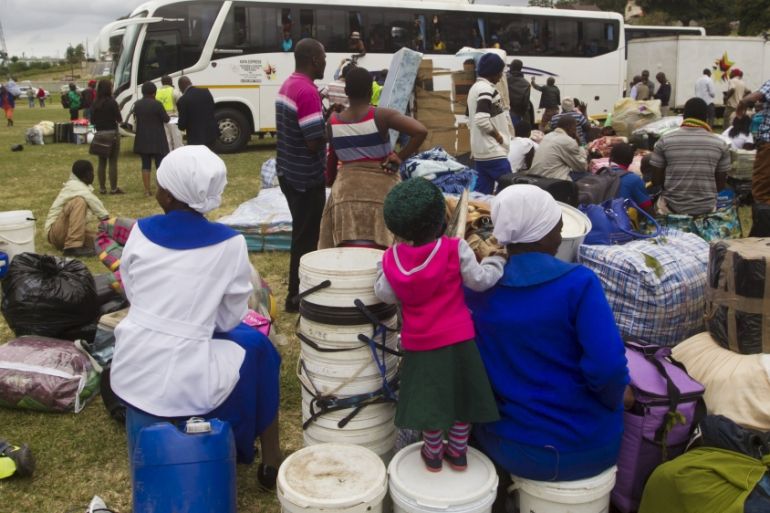Zimbabweans leave South Africa after xenophobic attacks
At least 400 return to Zimbabwe facing uncertain future following attacks on foreign nationals across border.

Beitbridge, Zimbabwe – Hundreds of Zimbabwean nationals who fled attacks in South Africa are now being processed in a border town in Zimbabwe.
At least 400 people affected by xenophobic attacks in the city of Durban crossed into Zimbabwe late on Monday, spending the night at a camp set up in the border town of Beitbridge.
Keep reading
list of 4 items‘Mama we’re dying’: Only able to hear her kids in Gaza in their final days
Europe pledges to boost aid to Sudan on unwelcome war anniversary
Birth, death, escape: Three women’s struggle through Sudan’s war
They are expected to leave to different destinations across Zimbabwe later on Tuesday.
South Africa saw a wave of xenophobic attacks at the end of March, starting in Durban, and later spreading to the townships in and around Johannesburg. At least eight people were killed and thousands of others displaced.
Brenda Mavenge said she left Durban after her husband was attacked.
“My husband was attacked [and] he is in hospital right now.
“The men who attacked us took all our possessions, even cell phones. Now how will I communicate with my husband who is still in South Africa?” Mavenge asked.
![Returnees face an uncertain future as they enter an economy with an exceptionally high unemployment rate [Reuters]](/wp-content/uploads/2015/04/7f3bee5556a044d49d9dce77c497c0fe_18.jpeg)
Local media reported that out of the 407 repatriates, at least 92 were children. The Herald said 112 were women.
Returnees talking to Al Jazeera told horrific tales.
Peter Jongwe said he left because of the threats he received.
“I’ve been in South Africa for two years. We rented a 10-room house. Seven rooms had foreigners, the other three had South Africans who were Zulu.
“The Zulus said we must leave and they started breaking down our doors and stealing our things. I hid with my wife under the bed and thank God we escaped with our lives,” he said.
Psychological assistance
Maxwell Phiri, from Zimbabwe’s Red Cross, said some people were traumatised and needed psychological assistance.
“We are managing as best as we can. But we need more. Things like food, blankets, anything people can spare to help these families. More buses are coming from South Africa in a few days.”
Earlier reports said 700 Zimbabweans would leave Durban.
While many in Beitbridge expressed relief for having escaped the violence, many are also concerned about their future.
They have returned to a country with an unemployment rate sitting at close to 90 percent and the chances of finding employment are slim.
“I worked in construction in Durban. I used to send money home to my mother every month so she can look after my brothers and sisters,” returnee Dumisani Moyo said. “I left because I didn’t feel safe, but now that I am here what I am I going to do? You know there are no jobs here. How will I help my family now?”
South African authorities have struggled to maintain law and order in Johannesburg and Durban, where mobs have been attacking foreigners from Zimbabwe, Malawi, Mozambique and other African countries.
Foreigners have routinely been accused of taking jobs away from local South Africans, struggling in a job-strapped economy.